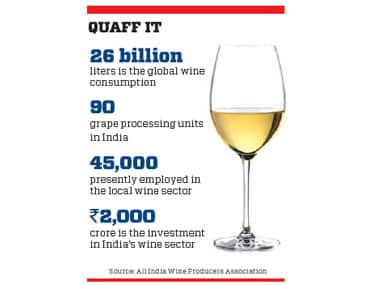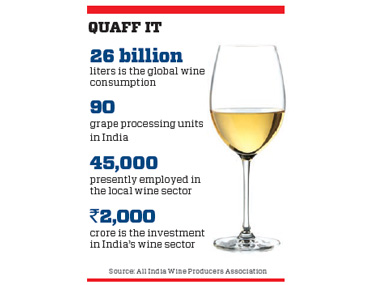She quit her job in event marketing to start a family. But for Shambhavi Hingorani, going back to full-time work like most urban Indian women do today was a very unattractive option. Instead, she wanted to get back to a job that had flexi-hours. But then, in India Inc., great jobs with flexihours are few and far in between.
After much thought towards a new career option, Hingorani decided agriculture was the best choice as it gave her plenty of time with her son. The next hurdle of course was to understand what that was all about and what crop could she grow.
Karnataka is a grape growing belt for both French and table (eating) varieties. Grape is also an easy crop to grow with just one crop cycle a year. Grapes it would be.
Daughter of former external affairs minister, SM Krishna, 40-year old Hingorani was soon to turn sommelier and entrepreneur with Bengaluru-based SDU Winery. Though the path to that had a few turns. Hingorani first started growing grapes in Nandi Valley, Karnataka back in 2002 on 25 acres of land she had bought.
About 18 months later, she harvested her first crop and began selling grapes to wineries in Maharashtra and Karnataka. However, just selling grapes was not fulfilling. She wanted to reach the end-user, says Hingorani, Director, SDU Winery.
Building the brand
To realize the true quality of her grapes,Hingorani set up SDU, a boutique winery in 2011 with a capacity to produce one lakh liters of wine annually. In 2012, Hingorani bought another 25 acres of land in ID Halli, Karnataka. “All our grapes are grown in-house as our focus is on qualityand consistency which many Indian wines lack,” she says.
Deva, named after her son, is an easy to drink wine with less complex traits but inherently Indian, positioned to cater to both first time drinkers as well as connoisseurs.
This was also the brief given to Andrea Valentinuzzi, winemaker at SDU. “It was a new challenge for me,” says Valentinuzzi who has spent 25 years in the wine making space. “We added his specifications to the winery,” Hingorani says.
Together, they have concocted two varietals of red wine-Deva Cabernet Sauvignon and Deva Syrah (Shiraz) in 750 ml and 350 ml size options. “Our focus is on South India now starting with Karnataka. Soon we will be in Mangalore too followed by Pondicherry and Goa,” says Mohit Nischol,Business Head, SDU.
Sitting pretty
Deva is available across 45-50 modern trade and independent retailers in Bengaluru and Mysore in addition to food and beverage (F&B) outlets. “We will target four and five star hotels once our white wine is out,” says Nischol.
The boutique winery plans to be in 100 outlets by year-end. B J Vikram, owner of Dewars Wine
Store in Bengaluru, has been stocking Deva since its launch and sells three-four cases a month of each red varietal. “Deva comes in an attractive bottle which stands out when you place it with others. It looks Indianized unlike others that look imported,” says Vikram.
Ajay Shetty Managing Director of Bengaluru-based Myra Vineyards, another new entrant in the sector that was launched in December 2011 says the country produced 1.5 million cases of winelast year.
“India is going through lifestyle and consumption changes. Wine is a known option for many cuisines and awareness about it has grown,” notes Shetty.
Teasing palates
Deva has been gradually tantalizing taste buds, a conscious strategy adopted by the promoters to fight big names and get shelf space. “We sent out individual bottles to people in the trade,” says Nischol.
This, coupled with tasting sessions, made up the launch strategy. At restaurants, F&B managers are asked to offer small quantities as a sampler to guests and take feedback to introduce Deva inthe hope of future conversions.

Cafe Max at Max Mueller Bhavan in Bengaluru serves only wine on its alcohol menu. Shweta Gupta, Director, Cafe Max says they have been educating customers on newer Indian wines like Deva with free tasting sessions and sampling at events. Both Gupta and Vikram mention that Deva has been doing better than other new entrants when compared to only the reds. “Deva sells 10 percent more than Fratelli and Vindiva,” says Vikram.
Price wars
Competitive pricing could be a catalyst too. A 750 ml bottle of Deva Cabernet Sauvignon and Syrah are priced at Rs 600 and Rs 500 respectively, while Fratelli and Vindiva cost a couple of hundreds more. For Pondicherry and Goa markets, Deva wines will be priced at Rs 500 and Rs 450 respectively.
Similarly, Myra wines cost Rs 620 and Rs 650 while in Maharashtra they cost Rs 575 and Rs 620, for whites and reds respectively, both for 750 ml options. As part of its brand building exercise, the company runs a brand ambassador program wherein it has engaged 25 couples who know their wine well. “We’re sending them our wines on a monthly basis,” shares Nischol.
Andhra Pradesh is next on the firm’s radar followed by Mumbai by 2015. “We want to widen our portfolio and go national in the next two years,” Hingorani says.
Earlier this year, Deva had its first premium varietal in the Rs 800 to Rs 1000 price slot too.
This article first appeared in Entrepreneur India magazine
)